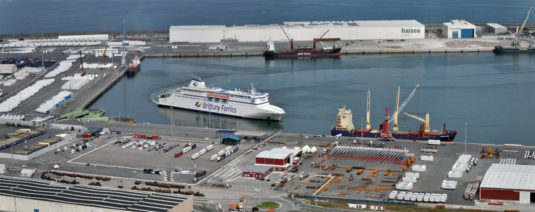This coming Tuesday, 20 July, and after eight months without service, the Brittany Ferries ferry Cap Finistère will resume its crossings between the port of Bilbao and the English port of Portsmouth, with three connections per week (Tuesday, Friday and Sunday).
For ten years, this ferry has been providing a service in the port of Bilbao for both ro-ro cargo and passengers, and only this year has it had such a long break due to the pandemic. The shipping company also has connections for cargo and passengers with Rosslare, in Ireland, and the freight-only service to the port of Poole, in the south of England. All of which demonstrates Brittany Ferries’ firm commitment to the port and the area.
The company is delighted to be able to resume the route with Portsmouth with all the required health guarantees. In the words of Roberto Castilla, director in Spain for Brittany Ferries: “It is reassuring to see the Cap Finistère back in the port of Bilbao. After a year and a half of the pandemic, our passengers want to be able to make plans and one of them is to travel. Brittany Ferries is working to face a safe future to maintain connectivity between the ports of Bilbao and Portsmouth. It is possible for the pandemic to coexist with freedom of movement, which is why we have earned our customers’ trust and confidence. Likewise, freight traffic with the United Kingdom through Bilbao means the strengthening of our ro-pax services, with three weekly calls”.
For his part, the President of the Port Authority, Ricardo Barkala, values “the enormous effort that Brittany Ferries has made to maintain its cargo routes during the pandemic, as well as the fact that it has resumed this important service with Portsmouth when it has become possible to do so. Nor should we forget that this year is particularly complicated due to the economic crisis and Brexit, which will force us to tighten controls on arrival”.
Looking to the future
After the adversities brought about by the Covid-19 crisis, Brittany Ferries is looking to the future with optimism and with a clear objective: economic recovery. One of the fundamental pillars for this recovery is commitment to the energy transition, with vessels powered by LNG (liquefied natural gas).
In early 2022, the Salamanca will be the first LNG-powered Brittany Ferries vessel, and will in fact be operating on the Bilbao-Portsmouth crossing. At 215m. long, it will be the longest vessel in the fleet, with a capacity for up to 1,015 passengers and to transport up to 2,714 linear metres of passenger vehicles and lorries. The vessel represents a significant saving in fuel consumption and emissions, a 10% improvement in passenger capacity and a 28% increase in cargo space. The Salamanca ferry will be joined in 2023 by the Santoña.
The President of the Port Authority applauded this initiative of the shipping company, “which is in line with this port’s strategy to become a model of sustainability. To this end, the port is drawing up an energy transition plan to
deliver a carbon-neutral scenario by 2050, in line with European, national and regional objectives”.
To prepare for the arrival of these new ferries, several joint tests have already been conducted. Furthermore, the Port Authority is carrying out refurbishment work at the berth, and the company Repsol is building a gas station for the supply of LNG.
Timetable of the Cap Finistère ferry. Route: Bilbao-Portsmouth
| Arrival | Departure | |
| Tuesday | 17.30 h. | 20.30 h. |
| Friday | 07.45 h. | 10.30 h. |
| Sunday | 12.45 h. | 15.30 h. |
Brittany Ferries in figures (non-Covid year)
– Annual turnover: around EUR 444.2 million.
– Multi-million dollar investment in three new vessels, including two powered by LNG (liquefied natural gas), a cleaner fuel.
– Employment: between 2,400 and 3,100 employees (including 1,700 seamen), depending on the time of year. 360 in the UK.
– Passengers: between 2.5 and 2.7 million every year, travelling in approximately 900,000 cars.
– Cargo: 205,400 units shipped every year, with one freight-only route between Bilbao and Poole.
– Twelve vessels operating services connecting France, the UK, Ireland and Spain.
– Twelve ports in all: Bilbao, Santander, Portsmouth, Poole, Plymouth, Cork, Rosslare, Caen, Cherbourg, Le Havre, Saint-Malo and Roscoff.
– Tourism in Europe: 854,000 unique visitors, with 9.2 million overnight stays in France in 2019.


 Port access
Port access